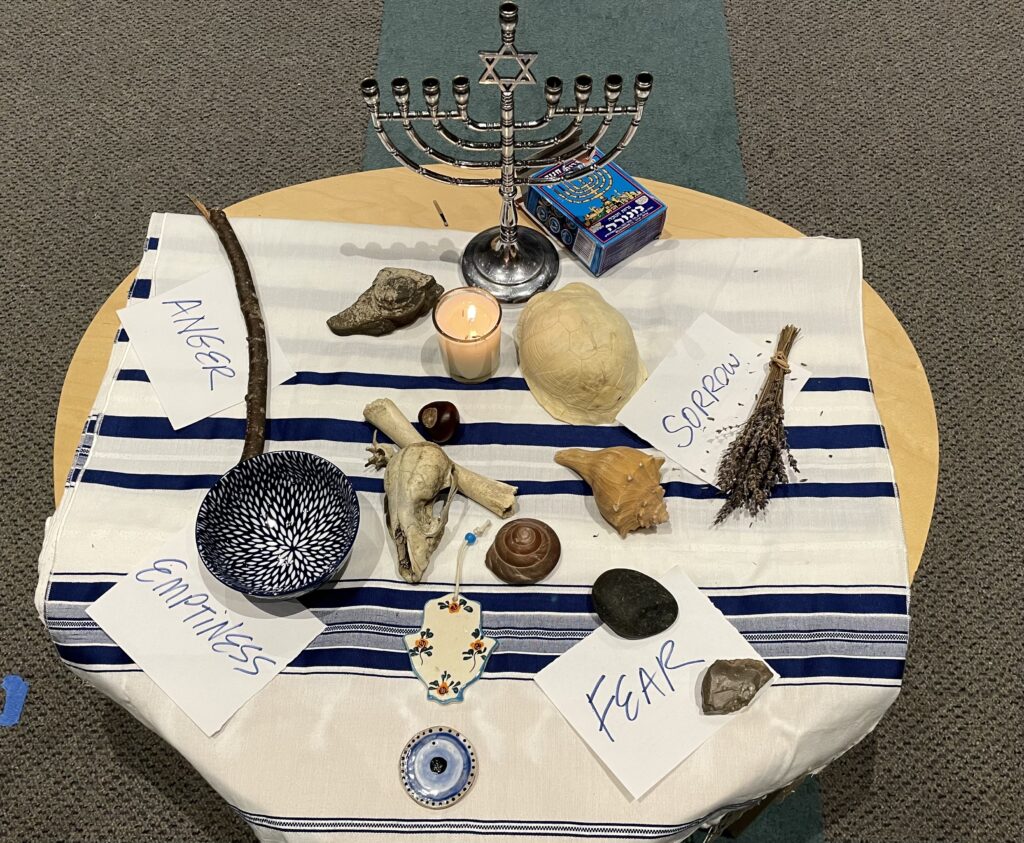
Nothing about the ongoing conflict in Israel/Palestine or the historic and political context that gave rise to it is pleasant or easy to address. According to my daily email from the Israeli newspaper Haaretz, today is day 97. 97 days of this news cycle that has taken so many twists and turns – here at home as much as in the Middle East. And there’s no end in sight. No end to the agony in Gaza or distress in Israel.
You’ve likely felt pressure to take a side at some point in conversation with friends or co-workers. And you’ve probably had at least one encounter with a Jewish relative who doesn’t interpret things like you do.
While it hasn’t been easy, I have experienced pleasant moments in this community talking about what’s happening. Pleasant in the sense that they have brought me satisfaction, gratifying a need I have to wrestle with it all in community with others. I feel truly blessed to have Sukkat Shalom. In this moment I feel we are really living into our name, providing a Shelter of Peace for courageous conversations.
Since October 7th, Sukkat Shalom has hosted various opportunities for people to come together and talk – openly and honestly. We have planned in-person discussions and Zoom calls with folks on the ground in Israel as collective learning opportunities, not lectures. While many of us send one another news articles and editorials privately, as an organization, our events have centered around personal experiences, feelings, and responses. In this way, we and our range of perspectives becomes the content.
This is a recommendation I hear repeatedly for holding conversations with people who hold different views than you. Pick a political issue in the news and it’s likely been polarized. Experts suggest that the only chance we have for opening the minds of those we’re talking to is through personal connection. An oft cited success case for this is the move to legalize gay marriage. It wasn’t until brave LGBTQ+ people lived their lives “loud and proud” that a majority of Americans realized they knew and loved people who lacked the ability to marry those they loved and joined their calls for equal rights.
In a recent Torah in These Times offering, Rabbi Yael Levy spoke about how hard it was for the Israelites to hear Moses when he told them G?d was going to free them from bondage in Egypt and deliver them to the promised land, because their hearts had been hardened by all the pain and suffering they were experiencing. They were so entrenched in negativity, they had no space for imagining a better future. Rabbi Yael tied this with our current struggle to see past our current conflicts – past the ongoing torment of Palestinians in Gaza, the failure of the Israeli government to meet their democratic goals, the increasingly polarized debates over antisemitism and free speech on American college campuses, the ongoing rape of Mother Nature, a former President running on the promise to be a dictator if only for one day. Sharing her own heartbreak she suggested:
“We need to see the suffering and cry out. Not in blame. Not that there isn’t blame [to be cast] but somehow we must see all the suffering and allow our hearts to break. There’s enough suffering for us all to cry out. Before we act – and we must act – we need to feel… Our ancestors couldn’t hear the call of something else unfolding. Can we?”
Her commentary helped me understand the importance of the work we’ve been doing in a new way. Making space for personal stories from a wide range of perspectives we are literally shedding light on the subject. In this way, each story we tell, each new voice we listen to can be understood as an act of tikkun, repair for this broken world. What story have you heard recently that broke your heart open?
There’s certainly need and space for learning facts, but it’s equally important to lean into feelings. Subscribe to our newsletter and calendar to be sure you hear about our upcoming opportunities to soften your heart.
Jodi Kushins, KSS Chair and Lay Leader
[Related listening recommendation: Open to Debate: “Curious Conversations in Dangerous Times with Mónica Guzmán“
Haaretz Podcast: “How Can We Expect Others to Empathize With Us When We Fail to Empathize With Palestinians?“ (Look for this thought-provoking and heart-softening intrerview with Rabbi Sharon Brous, founder of the IKAR synagogue in Los Angeles where you listen to your favorite podcast.)
